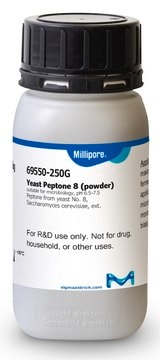SCT012M
LuminiCell Tracker 540- Vascular Labeling Kit
Biocompatible organic fluorescent nanoparticles (AIEDots) that can be used to fluorescently tag vasculature in living tissues and animals for studies of inflammation and vascular leakage.
Synonym(e):
AIEDots Cell Tracker Dye, AIE Live Cell Fluorescent Dye, Fluorescent Cell Tracking Dye, Live Cell Fluorescent Nanoparticles
Anmeldenzur Ansicht organisationsspezifischer und vertraglich vereinbarter Preise
Alle Fotos(1)
About This Item
UNSPSC-Code:
12352207
eCl@ss:
32161000
NACRES:
NA.47
Empfohlene Produkte
Allgemeine Beschreibung
Absorbance Maximum: 423nm
Emisson Maximum: 540nm
Suggested Filters:
Excitation: 405/458/488nm
Emisson: 480-560nm
Emisson Maximum: 540nm
Suggested Filters:
Excitation: 405/458/488nm
Emisson: 480-560nm
Long-term noninvasive cell tracking by fluorescent probes and quantum dots is of great importance to life science and biomedical engineering. Current methods used to fluorescently tag cells have been limited by short signal duration, high background auto-fluorescence or lengthy molecular cloning manipulations using GFP. LuminiCell Trackers<TMSYMBOL></TMSYMBOL> are biocompatible organic fluorescent nanoparticles based on Aggregation Induced Emission technology, termed AIEDots. Aggregation induced emission (AIE) molecules emit fluorescence in an opposite manner than other common fluorophores (Quantum Dots, GFP). Propeller-shaped AIE fluorogens are non-emissive in solutions but become highly fluorescent upon aggregate formation. Due to these differences, LuminiCell Trackers<TMSYMBOL></TMSYMBOL> have very high fluorescence intensities with minimal signal quenching allowing live cell fluorescent tagging for up to 10 days in vitro and 21 days in vivo. These properties make them optimal candidates for long interval live cell bioimaging experiments.
The Luminicell Tracker<TMSYMBOL></TMSYMBOL>-540 Vascular Labeling Kit contain green fluorescent AIEDots nanoparticles without TAT sequences. These nanoparticles can be used to fluorescently tag vasculature in living tissues and animals for studies of inflammation and vascular leakage.
Features and Benefits
● Brighter: 10X brighter than other cell labeling technologies
● Photostable: 3X longer fluorescence without signal quenching
● Biocompatible: Non-toxic organic nanoparticles intended for biological applications
● Rapid Protocol: Easy-to-use protocol labels cells within 4 hours
The Luminicell Tracker<TMSYMBOL></TMSYMBOL>-540 Vascular Labeling Kit contain green fluorescent AIEDots nanoparticles without TAT sequences. These nanoparticles can be used to fluorescently tag vasculature in living tissues and animals for studies of inflammation and vascular leakage.
Features and Benefits
● Brighter: 10X brighter than other cell labeling technologies
● Photostable: 3X longer fluorescence without signal quenching
● Biocompatible: Non-toxic organic nanoparticles intended for biological applications
● Rapid Protocol: Easy-to-use protocol labels cells within 4 hours
Anwendung
Biocompatible organic fluorescent nanoparticles (AIEDots) that can be used to fluorescently tag vasculature in living tissues and animals for studies of inflammation and vascular leakage.
Qualität
Absorbance: 422+-5nM
Concentration: 180-220nM
Fluorescence: 540+/- 10nm
Quantum Yield: ≥50%
Brightness at 540nM: ≥3X10^7 M-1cm-1
Concentration: 180-220nM
Fluorescence: 540+/- 10nm
Quantum Yield: ≥50%
Brightness at 540nM: ≥3X10^7 M-1cm-1
Physikalische Form
500nM in 0.5ml PBS, pH 7.4
Lagerung und Haltbarkeit
Store at -2-8°C upon receipt. Thaw at room temperature or in a water bath. Do not Freeze.
Note: Some particulates may form as a result of nanoparticle aggregation during shipping. To get particulates back in solution, sonicate the vial containing LuminiCell Tracker three times for 1 min each before use.
Note: Some particulates may form as a result of nanoparticle aggregation during shipping. To get particulates back in solution, sonicate the vial containing LuminiCell Tracker three times for 1 min each before use.
Haftungsausschluss
Unless otherwise stated in our catalog or other company documentation accompanying the product(s), our products are intended for research use only and are not to be used for any other purpose, which includes but is not limited to, unauthorized commercial uses, in vitro diagnostic uses, ex vivo or in vivo therapeutic uses or any type of consumption or application to humans or animals.
Lagerklassenschlüssel
12 - Non Combustible Liquids
WGK
WGK 2
Flammpunkt (°F)
Not applicable
Flammpunkt (°C)
Not applicable
Analysenzertifikate (COA)
Suchen Sie nach Analysenzertifikate (COA), indem Sie die Lot-/Chargennummer des Produkts eingeben. Lot- und Chargennummern sind auf dem Produktetikett hinter den Wörtern ‘Lot’ oder ‘Batch’ (Lot oder Charge) zu finden.
Besitzen Sie dieses Produkt bereits?
In der Dokumentenbibliothek finden Sie die Dokumentation zu den Produkten, die Sie kürzlich erworben haben.
Long-Term Tracking Mesenchymal Stem Cell Differentiation with Photostable Fluorescent Nanoparticles.
Shiying Liu et al.
ACS applied materials & interfaces, 8(19), 11925-11933 (2016-04-29)
Mesenchymal stem cells (MSCs) have proved to be a promising and abundant cell source for tissue and organ repair in regenerative medicine. However, the cell fate, distribution and migration of these transplanted cells are still unclear due to the limited
Kai Li et al.
Scientific reports, 3, 1150-1150 (2013-01-30)
Long-term noninvasive cell tracing by fluorescent probes is of great importance to life science and biomedical engineering. For example, understanding genesis, development, invasion and metastasis of cancerous cells and monitoring tissue regeneration after stem cell transplantation require continual tracing of
Aggregation-Induced Emission: Together We Shine, United We Soar!
Ju Mei et al.
Chemical reviews, 115(21), 11718-11940 (2015-10-23)
Unser Team von Wissenschaftlern verfügt über Erfahrung in allen Forschungsbereichen einschließlich Life Science, Materialwissenschaften, chemischer Synthese, Chromatographie, Analytik und vielen mehr..
Setzen Sie sich mit dem technischen Dienst in Verbindung.







